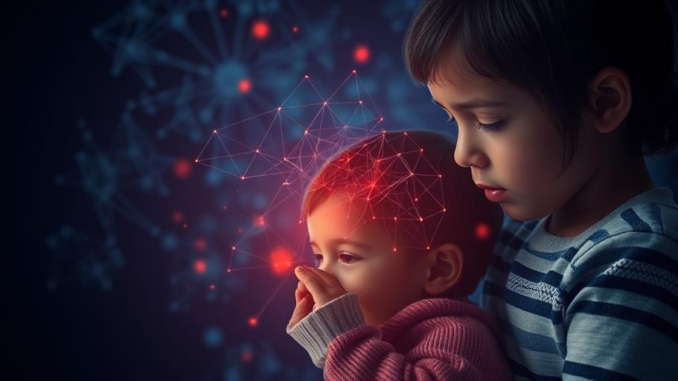
Summary
This article explores the impact of a mother’s difficult childhood on children with neurodevelopmental disorders like ADHD and autism. Research indicates that maternal adverse childhood experiences (ACEs) correlate with similar experiences reported by their children, potentially influencing the child’s emotional regulation and stress management. This emphasizes the need for comprehensive support systems that consider family history when addressing neurodevelopmental challenges.
Stress-free data management TrueNAS is healthcares trusted solution for compliant data management.
** Main Story**
We often hear about the impact of genetics on neurodevelopmental disorders like ADHD and autism, but what about the role of a mother’s past experiences? New research is shining a light on a powerful, and sometimes overlooked, connection: a mother’s troubled childhood can cast a long shadow, significantly impacting her children, especially those with neurodevelopmental conditions.
The Maternal Link: More Than Just Genes
Recent studies reveal a noteworthy correlation between a mother’s adverse childhood experiences (ACEs) – things like abuse, neglect, or a chaotic home environment – and the challenges her child faces when diagnosed with ADHD or autism. It’s a reminder that healthcare needs a holistic approach. Considering the family history is key to understanding a child’s developmental journey. It’s not just about treating the symptoms, it’s about understanding the bigger picture.
These studies have shown that mothers who’ve weathered difficult childhoods are, sadly, more likely to have children who also report similar adversities. This intergenerational transmission of trauma seems particularly prominent in kids with neurodevelopmental disorders. You know, it’s like the past echoes into the present.
The exact science is still being worked out, but researchers think a mother’s past trauma can shape her parenting style, her ability to manage stress, and even how she forms secure attachments with her child. All of which, can then affect the child’s emotional regulation, their resilience, and their ability to cope with everyday hurdles. Now, add a neurodevelopmental disorder into the mix, and you’ve got a complex web of vulnerabilities.
What About Dad?
Interestingly, the same correlation hasn’t been found between a father’s tough childhood and his child’s experiences with neurodevelopmental disorders. Does this mean dads aren’t as important in the equation? Not at all! There are several possible explanations for this discrepancy, like differences in traditional caregiving roles, the fact that fathers are often underrepresented in research, and the unique dynamics of the mother-child bond. More research is definitely needed to truly understand this interplay.
For instance, I remember volunteering at a children’s hospital years ago, and I noticed the mothers were almost always the primary caregivers present. That doesn’t diminish the father’s role, of course, but it does highlight how societal expectations can influence the dynamics.
Why Early Intervention Matters – Now.
All of this highlights the vital need for early intervention and robust support systems for families navigating neurodevelopmental disorders. Screening parents for ACEs can give valuable insights into a child’s challenges, helping us tailor interventions to be more effective. Think of it as personalized medicine, but for the whole family.
Rather than just focusing on the symptoms, understanding the family’s history allows healthcare pros to get at the root causes of a child’s difficulties. This holistic approach should include parental education, therapy, and stress management. Creating a supportive environment for both parents and children helps build resilience, improve coping skills, and boost the child’s overall well-being. And honestly, who wouldn’t want that?
- Screening parents for ACEs provides valuable insights.
- A holistic approach helps address root causes.
- Supportive environments for families promote resilience.
The Spectrum of Neurodevelopmental Disorders: A Quick Overview
It’s also worth remembering that neurodevelopmental disorders are a broad category, encompassing a range of conditions that affect brain development and function. These conditions can show up in all sorts of ways, impacting a child’s learning, communication, social skills, behavior, and motor abilities. Some common examples include:
- Autism Spectrum Disorder (ASD): This is characterized by challenges with social interaction, communication, and repetitive behaviors.
- Attention-Deficit/Hyperactivity Disorder (ADHD): Marked by inattention, hyperactivity, and impulsivity.
- Learning Disabilities: Impairments in specific academic skills like reading, writing, or math.
- Intellectual Disability: Significant limitations in intellectual functioning and adaptive behavior.
Unfortunately, these disorders can often overlap, making diagnosis and treatment even more challenging. Early identification and intervention are so important for maximizing a child’s potential and minimizing the long-term impact of these conditions, even if its just catching a slightly misplaced issue like a misplaced comma that is just a mistake.
A Call to Action: Let’s Do Better
The link between maternal ACEs and the difficulties faced by children with neurodevelopmental disorders is a wake-up call. It’s time we embraced a more compassionate and comprehensive approach to pediatric care. By understanding the interplay of family history, environmental factors, and individual vulnerabilities, we can create a more supportive, effective system. One that empowers both parents and children to thrive and I think, moves us toward a more empathetic and effective system of care.
As of today, this research marks a big step forward in our understanding of neurodevelopmental disorders, paving the way for more informed and individualized interventions. This has the potential to change how we approach pediatric care, moving beyond just managing symptoms to addressing the underlying factors that contribute to a child’s challenges. Research is ongoing, of course, and our understanding of these complex relationships will only continue to evolve. It really makes you think, doesn’t it?


Be the first to comment